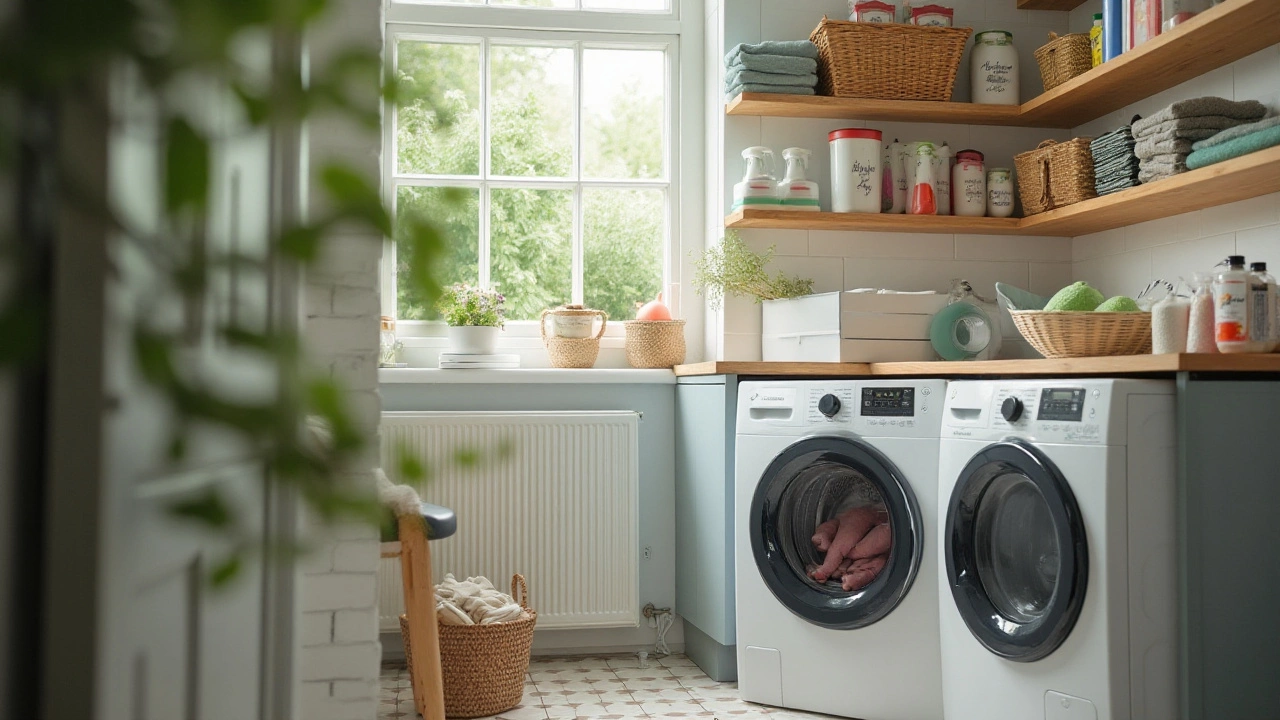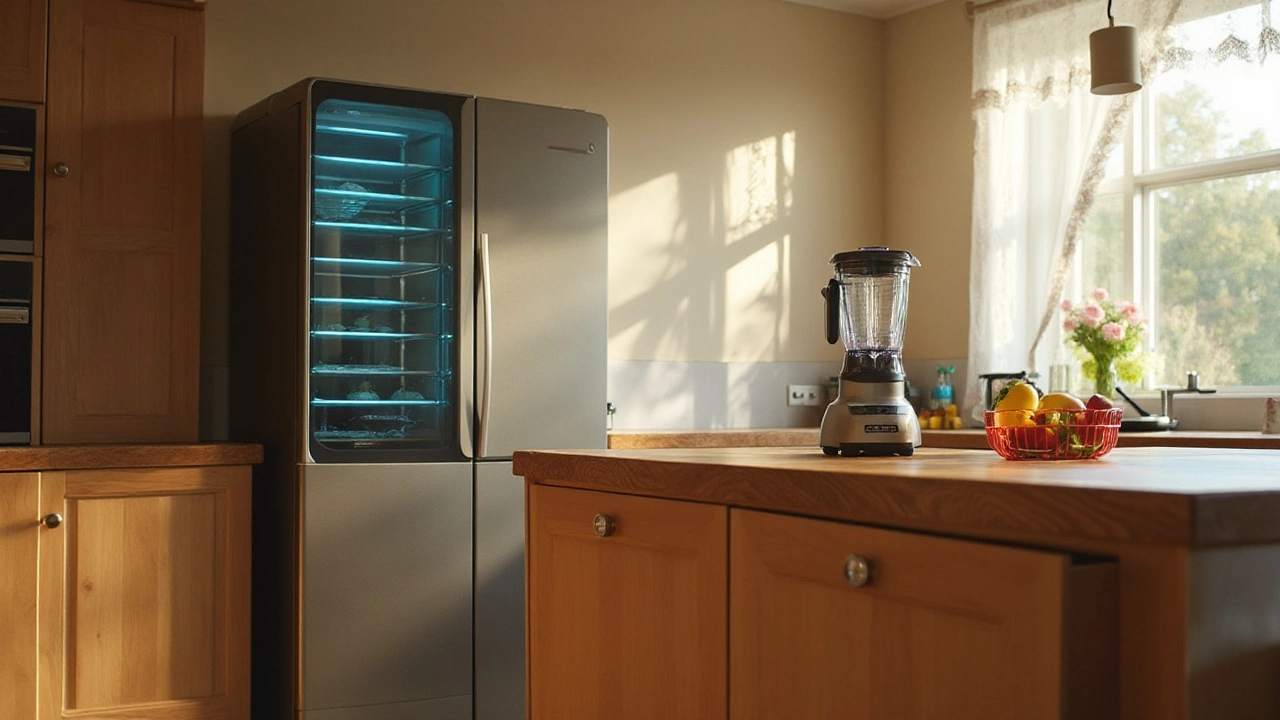In today’s fast-paced world, home appliances have become indispensable, transforming the way we manage everyday tasks. They range from basic necessities like refrigerators and microwaves to luxury items such as dishwashers and smart home gadgets. Knowing the functions and benefits of these appliances not only helps in enhancing our homes but also in ensuring they operate efficiently.
By delving into the world of appliances, you will discover not only the ingenuity behind them but also practical tips on how to maintain their longevity. Whether you're a first-time buyer or someone looking to upgrade, understanding the significance of these devices is essential.
- Defining Home Appliances
- The Role of Kitchen Appliances
- Laundry and Cleaning Devices
- Tips for Appliance Maintenance
Defining Home Appliances
Home appliances are the unsung heroes of modern living, integral to making life comfortable, convenient, and efficient. They are mechanical or electrical devices designed to perform household functions such as cooking, cleaning, or food preservation. Common examples include refrigerators, which keep perishable food fresh; microwaves, which cook or warm food at lightning speed; and washing machines, which have transformed the chore of laundry by automating the cleaning process. These household devices are so embedded in our daily routines that it's easy to take them for granted until one breaks, making appliance service an essential part of home maintenance.
The evolution of home appliances has followed the trajectory of technological advancement, intertwining with societal changes. At the heart of their development has been the desire to reduce manual effort and maximize time efficiency. During the early 20th century, as electricity became more widespread, the foundation for modern appliances was laid. Innovations like the electric range changed the way families cooked, and the electric washing machine liberated many from the labor-intensive task of hand washing garments. This liberation continued through the decades with inventions such as the dishwasher, which in some cultures is seen as an essential component of the kitchen gadgets roster.
"Appliances are to be savored for their role in modern history in being, perhaps, first and foremost a technology of liberation." - Ruth Schwartz Cowan
Today, the definition of a home appliance extends beyond traditional constructs, incorporating smart technologies that allow for remote control and customization. These innovations have brought us into the era of smart homes, where internet-connected devices provide unprecedented control over various aspects of home management. Imagine being able to preheat your oven while commuting home from work or being alerted by your fridge when you're out of milk. While these advancements offer enticing possibilities, they also reveal the increasing complexity and need for proficient appliance service specialists who can navigate the sophisticated technologies embedded in these devices.
Classifying these appliances can be done in various ways -- by their function, location, or the technology involved. A more apparent categorization is by the rooms they serve: kitchens boast a myriad of tools from cooktops to coffee makers, whereas laundry rooms house vital appliances like dryers and washers. An intriguing aspect is the design aesthetic, where style doesn't take a backseat but rides shotgun with function. Stainless steel, fingerprint-resistant surfaces, and sleek minimalism are driving modern appliance design trends, combining elegance with purpose.
In exploring the essence of home appliances, it's crucial to address the emerging emphasis on environmental sustainability. Modern consumers are leaning toward energy-efficient models that not only reduce utility bills but also minimize carbon footprints. Many manufacturers have made strides in developing Eco-friendly versions of common devices, marked by energy star ratings that signify adherence to environmental standards. As awareness of climate change grows, so too does the importance of making informed choices about the appliances one invests in. This convergence of ethics, efficiency, and aesthetics further enriches the narrative of home appliances, highlighting their evolving role in society.

The Role of Kitchen Appliances
Kitchen appliances are the unsung heroes of the home, diligently working in the background to make our lives convenient and our meals delectable. These devices, ranging from the everyday microwave to the sophisticated sous-vide machine, are reputed for reducing effort, minimizing food preparation time, and enhancing the safety of cooking processes. Not only do they boil water within seconds, but they also store food for weeks, keeping our produce as fresh as the day it was picked. The beauty of these appliances lies in their ability to cater to different culinary styles; whether one is a seasoned chef whipping up gourmet dinners or a busy individual needing a quick meal, there is a device tailored to every need.
The humble refrigerator, an appliance found in nearly every household, is a cornerstone of modern kitchens. Its ability to chill, preserve, and freeze food has revolutionized consumption patterns across the globe. The advent of energy-efficient models demonstrates how sustainability is becoming intertwined with tradition. And then there's the dishwasher, which is not just about cleanliness but also eco-friendliness, as modern models often use less water than hand washing. The trend of smart kitchens is another step forward, where the home appliance landscape adopts Wi-Fi connectivity, empowering users to start dinners before arriving home or scheduling groceries through interactive interfaces.
"The kitchen is the heart of the home. Without appliances, it would be a slog," said renowned chef and restaurateur Gordon Ramsay, capturing how indispensable these devices have become.
Among the myriad of kitchen gadgets, there's a growing affinity towards multi-purpose devices that save space and time. Consider the Instant Pot, for example, a multi-functional wonder capable of slow cooking, pressure cooking, and rice cooking, reflecting our evolving needs in culinary experiments. Breadmakers and juicers satisfy the artisan within us, while air fryers offer a healthier alternative for making crispy snacks. These innovations highlight how kitchen gadgets are closing the gap between professional kitchens and home cooking.
With a growing awareness towards healthier living, there's been a surge in appliances like blenders and food processors, expanding the boundaries of what we can create in a home kitchen. The addition of sensor technology in ovens ensures consistent cooking by monitoring heat levels and automatically adjusting as needed, proving that technology in appliances not only enhances convenience but also culinary excellence. They encourage even novice cooks to experiment, without the fear of failure that often accompanies traditional cooking methods.

Laundry and Cleaning Devices
Laundry and cleaning might not be the most glamorous tasks around the house, but thanks to a variety of modern devices, these chores have been transformed from labor-intensive drudgery into streamlined processes. Picture a world before washing machines, where clothes had to be hand scrubbed for hours—a stark contrast to today's push-button convenience. These indispensable home appliances not only save time but also enhance the quality of life, turning routine upkeep into a less burdensome task. A washing machine, for instance, has become synonymous with daily household operations. It takes on the arduous task of washing large loads of clothes, providing various cycles for optimal cleaning, and consuming less water than traditional washing methods.
Equally important is the dryer, which complements your washing machine by whisking away moisture, leaving your clothes dry in no time. Energy-efficient models even come with moisture sensors that adjust the drying time accordingly to save on electricity. Innovations like steam functions help to minimize wrinkling, thus reducing the need for ironing—a chore no one misses! Additionally, detergent dispensers in some high-end models release the perfect amount of cleaning agents, ensuring neither wastage nor inadequate cleaning. For those with a bit more space and budget, consider a standalone or integrated steam iron or press for that freshly laundered perfection.
Moving from laundry to cleaning, one can't overlook the role of vacuum cleaners, another pivotal category of household devices. Available in numerous designs—from upright and canisters to robotic models—these appliances cater to varied preferences and home setups. A significant innovation is the robotic vacuum cleaner, a testament to advancing technology. You can schedule these diligent helpers to patrol and clean your floors even when you're away. In an interview with Tech Digest, renowned tech analyst Sarah Lewis remarked,
"Robotic vacuums have redefined convenience in cleaning, with newer models even equipped with mapping technologies to navigate your home more efficiently."The effectiveness of these devices often hinges on their suction power and the adaptability to different floor types, with some models also capable of mopping—a two-in-one wonder!
For those looking to further streamline their cleaning routine, consider newer gadgets like cordless electric brooms and handy steam mops. These innovations, designed for spot cleaning and dealing with hard-to-clean surfaces, enrich the landscape of contemporary cleaning. Steam cleaners prove invaluable in sanitizing without harsh chemicals, making them ideal for homes with pets or children's play areas. Today's appliance service offerings also guide you in ensuring the longevity of these tools. Regular maintenance, such as disposing of vacuum cleaner filters and servicing the washing machines, can extend their lifespan significantly. A routine service check ensures efficiency and prevents breakdowns, keeping these home workhorses humming along smoothly.

Tips for Appliance Maintenance
Ensuring the longevity and efficiency of your home appliances requires regular maintenance and a little bit of attention. Appliances like refrigerators, washing machines, and dishwashers are investments in convenience, and proper upkeep can save you costly repairs down the line. One foundational aspect of maintenance involves understanding the specific needs of each device, as each appliance functions differently. For instance, keeping the refrigerator coils clean and free from dust can prevent overheating and improve energy efficiency. Regularly checking connections and hoses on a washing machine can prevent leaks and water damage in your home.
"An ounce of prevention is worth a pound of cure," said Ben Franklin, and this wisdom applies aptly to appliance maintenance. Regular care can extend the life of your equipment by years.
Another key aspect is being mindful of load capacities. Overloading machines, especially dishwashers and washing machines, may seem like a good way to cut down on chores, but it actually puts undue strain on the appliance, leading to quicker wear and tear. Listen to any unusual noises coming from your machines—these could be early indicators of underlying problems. When left unaddressed, these minor issues could evolve into major disruptions needing expensive solutions. Moreover, keeping a log of routine services such as filter cleaning, water softener refills, and inspections can help ensure nothing gets overlooked.
Implementing a few simple practices can go a long way in enhancing the lifespan of your household devices. For example, the microwave is often an unsung hero in the kitchen lineup, used mostly for reheating or cooking quick meals. Yet, proper maintenance involves more than just a wipe-down. Installing surge protectors can guard against electrical spikes that could damage electronic components. Adjusting placement—ensuring adequate ventilation—prevents unnecessary build-up of heat, which can affect performance.
Consider developing a schedule to remind yourself of when such tasks are due. Lubricating moving parts on appliances like garage doors or lawnmowers, clearing dishwasher spray arms, and checking stove-top burner efficiency are minor actions that have significant impacts. Not only do these practices aid longevity, but they also optimize energy efficiency, saving you money on utility bills. Investing a bit of time in regular inspections and cleaning can forestall unexpected breakdowns. Engage with the user manuals of your appliances as they are treasure troves of advice tailored to your specific model’s needs.
| Appliance | Common Maintenance Task |
|---|---|
| Refrigerator | Clean the coils, ensure door seals are intact |
| Dishwasher | Clear the spray arms, check door seals |
| Washing Machine | Inspect hoses for leaks, clean the drum |
Whether you're a utility-saving enthusiast or just looking to protect your home investments, applying these appliance service tips can keep your household running smoothly. As you refine your approach to appliance upkeep, you'll likely find that these devices operate more dependably, with fewer interruptions to your daily routine. Repair costs drop, and downtime becomes a rarity rather than a rule. Your effort builds a home that stands resilient against the wear and tear of everyday life, ensuring comfort and ease are always at arm's reach.

I am an expert in the services industry with a focus on appliance repair. My passion lies in understanding how things work and educating others in simple, engaging ways. This enthusiasm fuels my writing, where I delve into topics around appliance maintenance and troubleshooting. I aim to make these subjects clear and accessible to all readers.